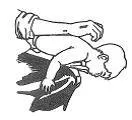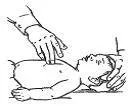Alcohol, Tobacco and Other Drugs
Your use of drugs; including alcohol, tobacco and medications; can affect your ability to care for your child. If you're breastfeeding, these substances can pass through your breast milk to your baby.
Alcohol
If you're breastfeeding, avoid drinking alcohol. Large amounts can cause drowsiness, weakness and slowed weight gain in your baby. It also can reduce the amount of breast milk made. And excessive alcohol can affect your coordination and judgment, which can endanger your baby.
Secondhand Smoke and Tobacco
Don't smoke around your baby or allow others to either. Secondhand smoke is a proven health risk to infants and young children. In addition to being a risk factor for SIDS, secondhand smoke causes many health problems in babies. They have an increased risk for respiratory and lung problems; such as asthma, pneumonia and bronchitis; ear infections; and colds. Make sure your baby is not exposed to any secondhand smoke.
Your smoking is unhealthy for your baby in other ways, too. Studies have shown that smoking decreases milk production in some women. Mothers who feel they can't quit smoking should keep breastfeeding. However, they are strongly urged to reduce their smoking and continue trying to quit.
Prescription and Illegal Drugs
Ask your healthcare practitioner which prescription drugs are okay to take while breastfeeding. Most prescription drugs women take will not harm their babies through breastfeeding, according to the American Academy of Pediatrics.
For your own health and safety, and that of your baby, do not take any recreational or illegal drugs.
If you have any concerns about the effects that other medications and supplements may have on your breast milk, contact your healthcare practitioner.
Choking Rescue (for infants up to 1 year old)

Assume your infant is choking if he or she cannot breathe, cough, cry or is making high-pitched sounds. Have someone call 911. Place the infant face down on your forearm, supporting the head and neck with your hand. Be sure not to cover the baby's mouth. Give up to five firm back blows between the infant's shoulder blades with the heel of your other hand.

If the infant becomes unconscious, have someone call 911. If you are alone, perform CPR (if trained) for two minutes, then call 911 and resume CPR. If not trained in CPR, call 911 immediately.